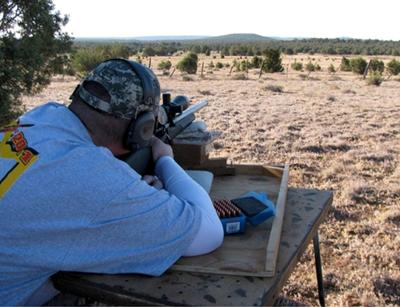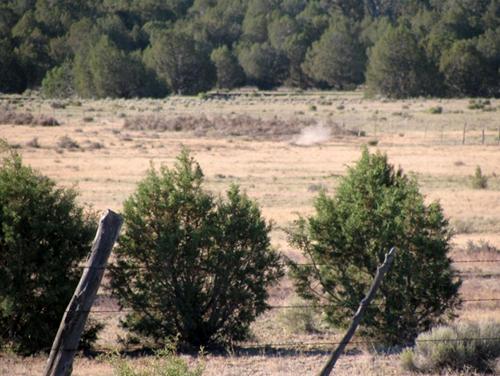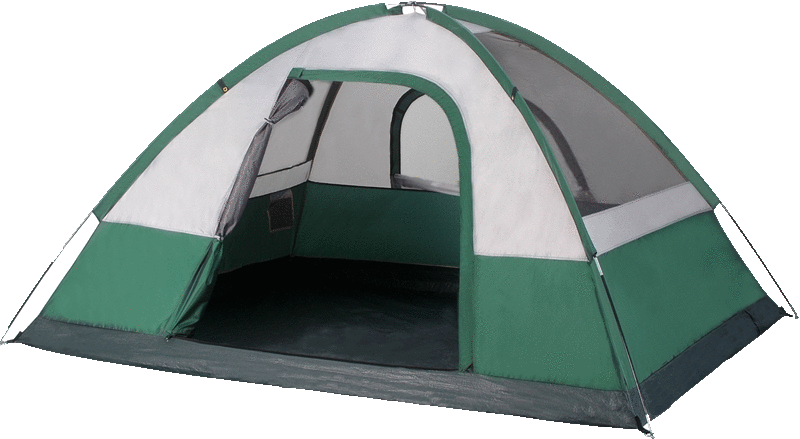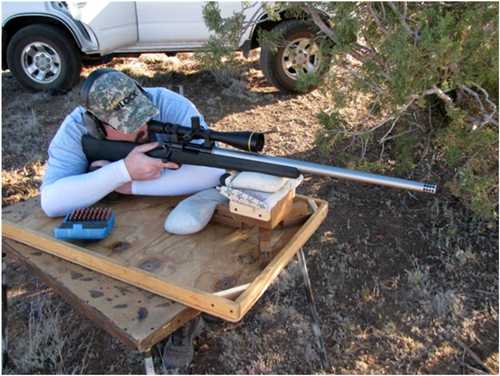A little while ago I was invited along on a prairie dog
hunt with Mike Kelly. I had never been on such an excursion, and thought
that would be a great opportunity to try out some of my more “accurate”
rifles. I quickly discovered that I did not have the right tools to get
the most out of the trip, and spent a lot of time watching Mike make red
mist of the critters.
This was the beginning of another project, because this was just too much
fun not to participate. Key ingredients had to be ¼ to ½ MOA accuracy
between 200-500 yards, and the recoil had to be nil in order to see the hits.
This was going to require a custom build, and the first step was to identify
the action type. For factory actions, Remington and Savage seem to have the
lead in this arena. Additionally, there are several full custom shops that
build ground up fully blueprinted actions for benchrest competition. My
choice was to start with a Remington 700 short action. This required finding
a suitable donor rifle at a reasonable price since the only thing that would
live on after the build would be the action and bolt. So off to the Cabelas
used racks and local pawn shops I went.

|
Within a couple weeks, I found a suitable Rem 700 in 243 Win for a reasonable
price, and home it came. The previous owners shortened both the barrel and
stock, which was of no importance since they would be junked as part of the
process. In the approximately 12 month window between purchasing the donor
rifle and going to the gunsmiths, Brownells got in a batch of new Remington
700 short actions. So instead of using the old busted down donor rifle I
bought a new action for the build. But now I have an excuse for another build.
The next step was to determine a round that would meet the requirements previously
discussed. This decision would change several times over the course of the next
several months, but had to be determined before purchasing a barrel. Caliber and
cartridge discussions with Mike Kelly filled many a trip to Wickenburg for the
Wickenburg Sportmen's Club’s practical pistol shoots. Every time seemed to bring
a new cartridge to the forefront – 22BR, 22-250AI, 6BR, 6PPC, 6XC, 6-250, 6-250AI,
and I am sure there were others.
Several things would need to be considered for this choice, such as availability
of brass (commercial vs fireformed), and loading dies (commercial vs custom), as
well as known performance in the worlds of competition and varminting.
In the end I chose the 6BR, a cartridge well known for its accuracy. Plus, brass
and loading dies are commercially available for this round. The 6mm bullet would
be good for wind and the small cartridge kept the recoil to a minimum. With this
decision a barrel could be purchased. I chose a Kreiger barrel with a heavy
varmint profile. This is easily the heaviest part of the whole firearm, which
currently tips the scales at over 13 pounds.

Reaching out to 250 yards
|
One last thing before I could go the gunsmith, what stock to choose? For stability
the stock had to be either a wood laminate or a composite synthetic. I already
had another 700 with an HS Precision (composite) stock that I really liked, and
Remington happens to use HS Precision stocks on their factory police and heavy
varmint rifles. So I starting searching the internet, and it wasn’t long before
I found someone selling a “new take-off” stock from their Model 700 VS, and the
price was well within reason. So a deal was made and the stock found a new home.
Then off to the gunsmith went the parts to be reworked and assembled. In addition
to installing and chambering the barrel, the action was fully blue-printed. Before
coming home a Sako extractor was installed on the trued bolt, a Vais muzzle break
was added to the barrel to reduce felt recoil, the barrel channel on the stock was
opened up to accept the heavy varmint barrel and bedded to the action, and a Jewel
trigger installed.
Once home the optics went on, and I headed to the range to break it in. I couldn’t
have been happier with the results. Now all I need to do is fine-tune the loads and
head back to the dog towns.
That opportunity came last June, Gerhard and I took a trip up north to the dog towns,
and what a difference the right equipment makes. Gerhard and I took turns on the table
switching out every five shots or so. It took a little to get the feel for the
distances and I still need a lot of work on reading the wind, but I was putting hits on
the targets. Let’s just say it was a very ”explosive” morning. I can’t wait for the
next opportunity to head to the dog towns.

![]()





